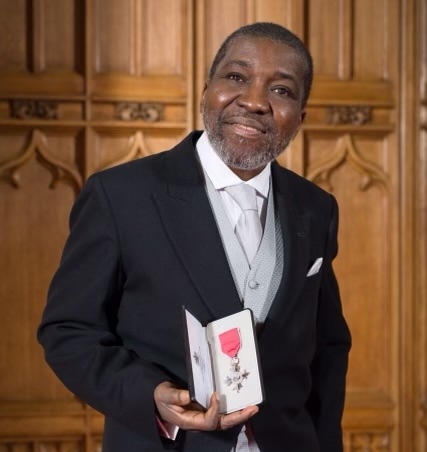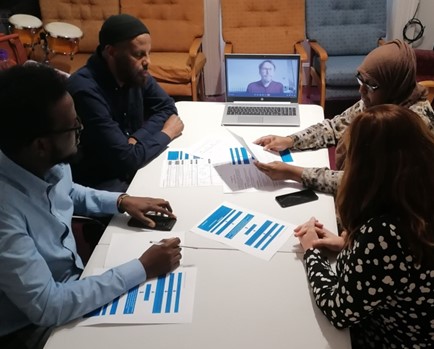Interview with Professor Ade Adebajo
Professor Ade Adebajo, Consultant Rheumatologist, Associate Medical Director at Barnsley NHS Foundation Trust and D4D Steering Committee member, spoke to our PPIE lead Lise Sproson about his career in patient involvement with research. From his introduction into research as a clinical fellow at Cambridge, through the challenges that faced patient involvement in research and the impact of the Covid pandemic, listen to his story and desire to make research more equal, diverse and inclusive.
“How did you first become involved in inclusivity and public involvement in your clinical career?”
Ade was first introduced to clinical research whilst working as a clinical fellow in Cambridge. During this time, his passion for research was awakened. However, at that time, this career path was very limited and largely lab based, but nevertheless, due to his passion for EDI and improving patient outcomes, Ade decided to focus on shoulder treatments, since it would have a greater benefit to the public.
After moving to Sheffield, Ade saw an advert for INVOLVE, a national advisory group which shared his enthusiasm for supporting active public involvement in NHS, public health and social care research. INVOLVE and Ade’s common view on shared decision making, led to him joining as the first hospital doctor of the group. INVOLVE was established in 1996 and has since been taken over by the NIHR Centre for Engagement and Dissemination.
A brief overview of the history of INVOLVE can be found here: INVOLVE supports public involvement in NHS, public health and social care research
“When you started, ‘how would you describe the position in terms of equality, diversity and inclusion in clinical research?”
Originally, working in Patient, Public Involvement (PPI) and Equality, Diversity and Inclusion (EDI) was potentially career limiting, therefore when Ade joined INVOLVE he was the only hospital doctor. However, the potential limits of the career path did not sway his passion for the role and desire to improve public participation within research. His role within INVOLVE included meeting with NHS Trusts, patient groups and working alongside the Department of Health and Social Care to support and improve participation and EDI. Ade progressed through the organisation and later became a member of the INVOLVE board.
“Could you describe the progress you have observed since that time and some of the many things that you have done to be involved to help shape that?”
Major world events have shaped the PPI and EDI landscape such as the AIDS crisis and the BLM movement. During the 1980s, the AIDS crisis spread fear across the world and helped start the discussion regarding patient involvement in research. Whereas many believed AIDS patients should automatically be involved in research to help learn about the disease, patient groups were created which pushed back against this agenda, coining the phrase ‘Nothing about us, without us’. This developed the PPI landscape by initiating the discussion of how to involve people in research to benefit both professionals and participants.
The unlawful killing of George Floyd in 2020 also promoted the topic of EDI within healthcare since it broke taboos and became a key feature of discussions regarding healthcare. The drive for more diversity and inclusivity in clinical research since this abhorrent event is clear to see. For example the work done by the NIHR to recognise the need to do more regarding BLM (NIHR stands by Black Lives Matter | NIHR) and the appointment of a National EDI lead (NIHR appoints new Head of Equality, Diversity and Inclusion | NIHR). These events are changing the EDI landscape for the better however, it cannot be completely changed overnight.
“As a reflection of the work that you have done in improving quality, diversity and inclusivity you were awarded and MBE, so I would love to hear about how that came about and maybe the ceremony?”
Ade was awarded an MBE in the Queen’s 2021 New Years Honours List for his services to promoting inclusive patient and public involvement in health research. The award was given to him by Princess Anne in the absence of the late Queen Elizabeth II.
“During the covid pandemic… we learnt a lot about how information on clinical research doesn’t necessarily spread as quickly or efficiently as it should and wondered if you had any thoughts?”
The decentralisation of clinical trials due to the covid pandemic has given the wider public more opportunities to participate in research. There has been a large increase in many other methods of participation in clinical research such as telephone calls, video calls and going into communities, which is a lot more patient centric and convenient. This allows us to reach a wider range of people since it breaks down barriers preventing people taking part in research such as physical mobility, social mobility and racial bias.
At D4D we have sessions within the community which allow a greater number of people to become involved in research and spreads the word about projects such as CognoSpeak (Home | Cognospeak), which members of the public who are under-represented within research can get involved with. Some examples of relationships with community groups include our collaborations with Israac (Israac – Bringing Communities Together) and ShipShape (Home | Shipshape). We are building a network of Community Research Champions in these groups which we hope to extend going further forward. D4D will be sharing further information about these projects in the near future.
“My final question to you today would be about areas of practice that you feel are working really well or new initiatives… and maybe a call to action or some advice for people listening today who are working to try and make clinical research as inclusive as possible”
Although, as we have seen, equality, diversity and inclusivity within the research landscape is changing for the better, there are still problems nationally, for example, current issues regarding participant payments. This issue is a huge barrier for participants from lower socio-economic backgrounds and therefore reducing the diversity of participants. We are working on a payment system that benefits participants and shows appreciation for their contributions rather than causing problems. The following link is the NIHR guidance on payments to study participants: Payment guidance for members of the public considering involvement in research | NIHR.
Data biases are also an issue in research since the outcomes of studies are using data from a few selective sections of society that do not represent many people. The NIHR has also recognised this issue and know that this needs to change. The following link shows the way that they are tackling this problem and their aims for change Diversity data | NIHR.







